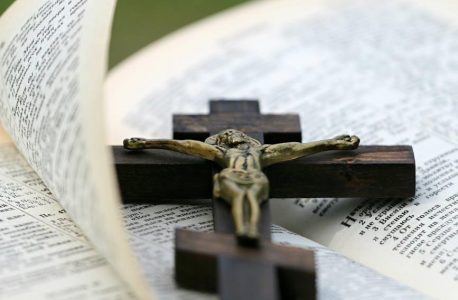The PDF version of Lord of the Flies offers a convenient and accessible way to explore William Golding’s timeless exploration of human nature and society.
Overview of the Novel
Lord of the Flies, written by William Golding, is a classic allegorical novel that explores the darker aspects of human nature. The story follows a group of young boys stranded on a remote island after a plane crash, with no adult supervision. Initially, they attempt to create a utopian society, but their innocence and civility gradually erode, revealing primal instincts and savagery. The novel delves into themes of power, fear, morality, and the thin line between civilization and chaos. Its universal appeal lies in its profound commentary on human behavior, making it a timeless piece of literature. The PDF version of the novel is widely available, offering readers a convenient way to engage with Golding’s thought-provoking narrative.

Significance of the Title

The title Lord of the Flies holds deep symbolic meaning, reflecting the novel’s exploration of human nature and the descent into savagery. The phrase is a translation of “Beelzebub,” a name for the devil, symbolizing evil and chaos. Golding uses it to represent the primal forces that emerge when societal constraints are removed. The “lord” signifies power and control, while “flies” evoke images of decay and corruption. This title encapsulates the novel’s central theme: the inherent darkness within humanity, which surfaces when civilization crumbles. The PDF version of the book retains this evocative title, ensuring readers immediately grasp the story’s ominous and thought-provoking tone.
Themes and Symbolism
Lord of the Flies delves into profound themes of human nature, civilization, and savagery, all vividly portrayed in its PDF format. The novel uses symbolism to convey these ideas, with the island representing a microcosm of society. The conch shell symbolizes order and democracy, while the “beast” embodies fear and superstition. The boys’ descent into chaos mirrors the collapse of societal norms, highlighting the fragility of civilization. The pig’s head, or “Lord of the Flies,” serves as a chilling symbol of primal instincts and evil. These themes and symbols are preserved in the PDF version, allowing readers to engage with Golding’s exploration of humanity’s darker aspects in a convenient digital format.

Plot Summary of “Lord of the Flies”
The story follows British boys stranded on an island after a plane crash, exploring their attempts at self-governance, descent into chaos, and eventual rescue, as detailed in the PDF.

Chapter Breakdown
The PDF of Lord of the Flies is divided into ten chapters, each progressing the story of boys stranded on an island. Chapter One, “The Sound of the Shell,” introduces the main characters and their initial attempt at civilization. Chapter Two, “Fire on the Mountain,” highlights their struggle to maintain order. Chapter Three, “Huts on the Beach,” explores their efforts to build shelter and maintain hope. Chapter Four, “Painted Faces and Long Hair,” reveals their descent into savagery. Chapter Five, “Beast from Water,” intensifies fear and superstition. Chapter Six, “Beast from Air,” escalates tensions. Chapter Seven, “Shadows and Tall Trees,” marks a turning point in their morality. Chapter Eight, “Gift for the Darkness,” showcases the tribe’s brutality. Chapter Nine, “A View to a Death,” portrays the tragic loss of innocence. Chapter Ten, “The Shell and the Glasses,” concludes with rescue and reflection, encapsulating the novel’s themes of human nature and civilization.
Key Events and Turning Points
The PDF of Lord of the Flies reveals pivotal moments that shape the narrative. The election of Ralph as leader in Chapter One establishes the boys’ initial attempt at democracy. The appearance of the “beast” in Chapter Five escalates fear, leading to division among the group. Simon’s discovery of the pig’s head in Chapter Seven marks a turning point, as it reveals the true nature of the “beast.” His tragic death in Chapter Eight symbolizes the loss of innocence and the rise of savagery. The theft of Piggy’s glasses in Chapter Ten and the subsequent chase highlight the boys’ complete descent into chaos. These events underscore the novel’s exploration of human nature and the collapse of civilization. The PDF format ensures these moments are accessible for readers to analyze and reflect on.
Character Development
The PDF of Lord of the Flies vividly portrays the transformation of its characters, revealing their inner struggles and societal roles. Ralph, the initial leader, evolves from a democratic figure to a more authoritarian one, reflecting the group’s decline. Jack’s descent from a choirboy to a power-hungry hunter symbolizes the rise of savagery. Piggy, the voice of reason, embodies intellect and morality, while his eventual death marks the loss of civilization. Simon’s journey from innocence to self-discovery, culminating in his tragic death, highlights the novel’s exploration of human nature. Roger’s transformation from a shy boy to a sadistic enforcer underscores the group’s moral decay. These character arcs, accessible in the PDF, provide a deeper understanding of Golding’s commentary on humanity.
Themes Explored in “Lord of the Flies”
The PDF of Lord of the Flies delves into themes of human nature, civilization, and morality, offering insights into society’s fragility and the rise of primal instincts through its digital format.
Human Nature and Civilization
The PDF of Lord of the Flies reveals William Golding’s profound exploration of human nature, contrasting civilization with primal instincts. The novel depicts boys stranded on an island, gradually descending into chaos, highlighting the thin line between order and savagery. Through their actions, Golding examines how fear, power, and survival instincts erode moral boundaries. The digital format allows readers to easily access and analyze these themes, offering a deeper understanding of how societal structures crumble without authority. The PDF version ensures that this timeless critique of human behavior remains accessible, enabling modern readers to reflect on the fragility of civilization and the inherent duality of human nature.
The Impact of Fear and Superstition
The PDF of Lord of the Flies highlights how fear and superstition drive the boys’ actions, escalating chaos on the island. The novel portrays fear as a primal force, manifesting in the boys’ belief in the “beast,” which symbolizes their deep-seated anxieties. As fear intensifies, it fuels paranoia, violence, and the collapse of rationality. Superstition further distorts their perception of reality, leading to irrational decisions and moral decay. The digital format allows readers to easily navigate and analyze these themes, providing insight into how fear and superstition undermine civilization. Golding’s exploration of these elements remains a powerful commentary on human vulnerability, accessible through the convenient PDF version of the novel.
The Role of Power and Leadership
The PDF of Lord of the Flies underscores the pivotal role of power and leadership in shaping the boys’ society. The novel explores how leadership dynamics, such as Ralph’s democratic ideals versus Jack’s authoritarian rule, influence the group’s behavior. The conch shell, a symbol of democracy, gradually loses its power as fear and savagery prevail. The digital format allows readers to easily analyze these themes, highlighting how leadership struggles mirror real-world political dynamics. Golding’s portrayal of power’s corrupting influence remains a central theme, accessible through the convenient PDF version, offering insights into how leadership shapes human behavior in isolation and crisis.
Morality and Ethics in Society
The PDF of Lord of the Flies highlights William Golding’s exploration of morality and ethics, revealing how societal norms crumble without civilization’s framework. The novel portrays the boys’ descent from innocence to savagery, illustrating the thin line between moral behavior and primal instincts. The conch shell, a symbol of order, gradually loses its significance as fear and chaos dominate. The beast, a metaphor for their inner fears, represents the moral decay within. The digital format allows readers to easily analyze these themes, emphasizing how quickly ethical standards erode when societal structures disappear. Golding’s work challenges readers to reflect on humanity’s inherent morality and its fragility in isolation.

Significance of the PDF Version
The PDF version of Lord of the Flies enhances accessibility, allowing readers to easily explore Golding’s exploration of human nature and society in a convenient digital format.
Accessibility and Convenience
The PDF version of Lord of the Flies provides unparalleled accessibility, allowing readers to download and access the novel instantly from various online platforms. Its digital format ensures compatibility with multiple devices, such as smartphones, tablets, and e-readers, making it easy to read on the go. The PDF’s portability and search functionality enhance the reading experience, enabling quick navigation and reference to specific chapters or themes. Additionally, the digital version eliminates the need for physical storage, making it a space-saving option for book lovers. This convenient format has democratized access to Golding’s classic, ensuring that readers worldwide can engage with its profound exploration of human nature and society without barriers.
Features of the Digital Format
The PDF version of Lord of the Flies offers a range of features that enhance readability and convenience. The digital format allows for easy navigation, with the ability to search for specific keywords, chapters, or themes. Readers can adjust font sizes and brightness to suit their preferences, ensuring a comfortable reading experience on various devices. The PDF also includes the full text of the novel, enabling seamless access to all chapters, from “The Sound of the Shell” to “The Shell and the Glasses.” Additionally, the digital version is lightweight and doesn’t require physical storage, making it ideal for students and enthusiasts alike. Its compatibility with multiple platforms ensures that the classic tale remains accessible to a modern audience.
Where to Download the Free PDF
Downloading the free PDF of Lord of the Flies is straightforward, with multiple reliable sources available online. Websites like thephilosopher.net and archive.org offer direct links to download the novel in PDF format. Simply search for “Lord of the Flies by William Golding PDF” and choose a trusted platform. Ensure the source is reputable to avoid malware or incomplete files. Many academic and literary websites provide free access to the full text, including all chapters from “The Sound of the Shell” to “The Shell and the Glasses.” This convenient option allows readers to enjoy the classic tale digitally, making it easily accessible for study or personal reading.

William Golding and His Work

William Golding, a Nobel Prize-winning author, crafted Lord of the Flies as a seminal work exploring human nature. The PDF format ensures his legacy remains accessible and widely read.
Biography of the Author
William Golding (1911–1994) was a British novelist, playwright, and poet. Born in Cornwall, England, he initially pursued natural sciences before shifting to literature. A former schoolteacher and Royal Navy veteran, Golding’s experiences during World War II deeply influenced his writing. His debut novel, Lord of the Flies, published in 1954, became a global phenomenon. Golding’s work often explored human nature, morality, and society. He was awarded the Nobel Prize in Literature in 1983 and knighted in 1988. His legacy endures through works like Lord of the Flies, now widely available in PDF format, ensuring his insights remain accessible to modern readers.

Major Literary Contributions
William Golding is renowned for his profound literary works that explore human nature, morality, and societal structures. His debut novel, Lord of the Flies, remains his most iconic work, but he also authored other significant novels like The Inheritors and Pincher Martin. These works delve into themes of survival, power dynamics, and the duality of human behavior. Golding’s writing often challenges readers to reflect on civilization’s fragility and the inherent darkness within humanity. His contributions extend beyond fiction, including essays and poetry that further explore existential and philosophical themes. The availability of his works, such as Lord of the Flies in PDF format, ensures his literary legacy continues to inspire and provoke thought globally.
Awards and Recognition
William Golding received widespread acclaim for his literary contributions, culminating in the Nobel Prize in Literature in 1983. His novel Lord of the Flies earned him the Booker Prize in 1980, solidifying his reputation as a master storyteller. Golding’s works are celebrated for their deep exploration of human nature, morality, and societal structures. The availability of Lord of the Flies in PDF format has further expanded its reach, ensuring his ideas continue to resonate with readers globally. His literary legacy is marked by numerous accolades, including honorary degrees and critical acclaim, making him one of the most influential writers of the 20th century.
Reception and Reviews of “Lord of the Flies”
Lord of the Flies has garnered critical acclaim for its profound exploration of human nature. The PDF version enhances accessibility, making this classic tale of survival and morality widely popular.
Critical Acclaim and Controversies
Lord of the Flies has received widespread critical acclaim for its deep exploration of human nature, society, and morality. The novel, available in PDF format, has been praised for its thought-provoking themes and vivid storytelling; However, it has also sparked controversy due to its graphic depiction of violence and unsettling implications about human behavior. Despite this, the PDF version has made the book more accessible, allowing readers to engage with Golding’s masterpiece in a convenient digital format. Its enduring popularity highlights its relevance in understanding human psychology and societal structures, ensuring its place as a classic in modern literature.
Reader Responses and Popularity
The PDF version of Lord of the Flies has further amplified its enduring popularity, making it easily accessible to a global audience. Readers have praised the novel for its thought-provoking themes and vivid portrayal of human nature. The digital format has encouraged widespread sharing and discussion, with many readers appreciating the convenience of carrying the classic tale on their devices. Its exploration of survival, morality, and societal collapse continues to resonate deeply, attracting both casual readers and scholars. The PDF’s availability has also led to increased engagement in educational settings, fostering deeper analysis and reflection on Golding’s timeless work.
Academic Analysis and Interpretations
The PDF version of Lord of the Flies has become a valuable resource for academic analysis, enabling scholars to easily access and study William Golding’s seminal work. Researchers often highlight the novel’s exploration of human nature, civilization, and morality, with the digital format facilitating deeper textual analysis. The ability to search and annotate the PDF has made it a popular choice for students and educators, fostering a richer understanding of Golding’s themes. Academic interpretations frequently emphasize the novel’s allegorical elements, such as the conch shell and the beast, which symbolize order and fear. The PDF’s accessibility has also encouraged global scholarly collaboration, further cementing the novel’s place in literary studies.

Adaptations and Interpretations
The PDF of Lord of the Flies has inspired various adaptations, including TV productions by Eleven and stage interpretations, showcasing its enduring influence and accessibility through digital formats.
Movie and Stage Adaptations
Lord of the Flies has been adapted into various forms of media, including television and stage productions. A notable TV adaptation is being developed by Eleven and BAFTA-winning screenwriter Jack Thorne, marking its first television interpretation. Additionally, Anthony Lau’s stark stage adaptation has received acclaim for its thrilling portrayal of the novel’s themes. These adaptations highlight the timeless relevance of Golding’s work, bringing its exploration of human nature to new audiences. The PDF version of the novel serves as a convenient resource for fans and creators alike, inspiring further interpretations and adaptations that keep the story alive across different mediums.
Modern Retellings and Influences
The PDF version of Lord of the Flies has inspired modern retellings and influenced various creative works. Its accessibility has allowed new generations to reinterpret Golding’s themes, sparking fresh adaptations in literature, film, and theater. The novel’s exploration of human nature continues to resonate, with contemporary writers drawing parallels to current societal challenges. Additionally, the discovery of an alternate manuscript for the novel’s 70th anniversary has fueled new discussions about its themes and legacy. The digital format of the book has also made it easier for educators and creators to explore its relevance in modern contexts, ensuring its enduring impact on storytelling and cultural discourse.
Cultural Impact and Legacy
The PDF version of Lord of the Flies has significantly contributed to the novel’s enduring cultural impact. Its widespread availability has made the story accessible to global audiences, ensuring its themes of human nature and civilization remain relevant. The novel’s exploration of societal breakdown continues to resonate, influencing modern literature, film, and theater. The discovery of an alternate manuscript for its 70th anniversary has further cemented its legacy, sparking new discussions about Golding’s vision. The PDF format has also enabled educators to integrate the novel into curricula, solidifying its place in academic discourse. As a result, Lord of the Flies remains a cornerstone of literary and cultural heritage, shaping conversations about humanity and society.
Educational Resources and Study Guides
The free PDF of Lord of the Flies is a valuable resource for students and educators, offering easy access to the full text for study and analysis.
Study Guides and Summaries
The free PDF of Lord of the Flies provides students and educators with a comprehensive resource for studying William Golding’s novel. The digital format includes the full text, allowing for easy access to key chapters like “The Sound of the Shell” and “Fire on the Mountain.” Additionally, the PDF enables users to highlight and annotate sections, facilitating deeper analysis of themes such as human nature, civilization, and fear. Summaries of major events and character development, like Ralph’s leadership and Jack’s descent into savagery, are readily available, making it an invaluable tool for classroom discussions and essay preparation. This accessibility enhances the learning experience, ensuring a thorough understanding of Golding’s profound exploration of societal dynamics.
Discussion Questions and Essays
The free PDF of Lord of the Flies includes discussion questions and essay prompts that delve into the novel’s core themes, such as human nature, morality, and leadership. These resources encourage critical thinking about characters like Ralph, Jack, and Piggy, and their roles in the story. Essay topics might explore the symbolism of the conch shell or the beast, while discussion questions prompt readers to reflect on how fear and power shape the boys’ actions. The digital format allows for easy access to these materials, making it simpler for students to engage with the text and develop well-supported arguments. This feature enhances the educational value of the PDF, providing a comprehensive tool for analyzing Golding’s work.
Teaching Materials and Lesson Plans
The free PDF of Lord of the Flies is accompanied by comprehensive teaching materials and lesson plans, designed to enhance classroom engagement and deepen understanding of the novel. These resources include detailed analyses of key themes, such as human nature and morality, as well as activities tailored to align with curriculum standards. Educators can access structured lesson plans that explore the novel’s symbolism, character development, and historical context. The PDF also features interactive discussion prompts and group activities, such as analyzing the conch shell’s significance or debating the ethics of leadership. Additionally, it provides assessment tools, like quizzes and essay topics, to evaluate student comprehension. These materials make the PDF an invaluable resource for teachers seeking to create dynamic and thought-provoking lessons on Golding’s classic work.

